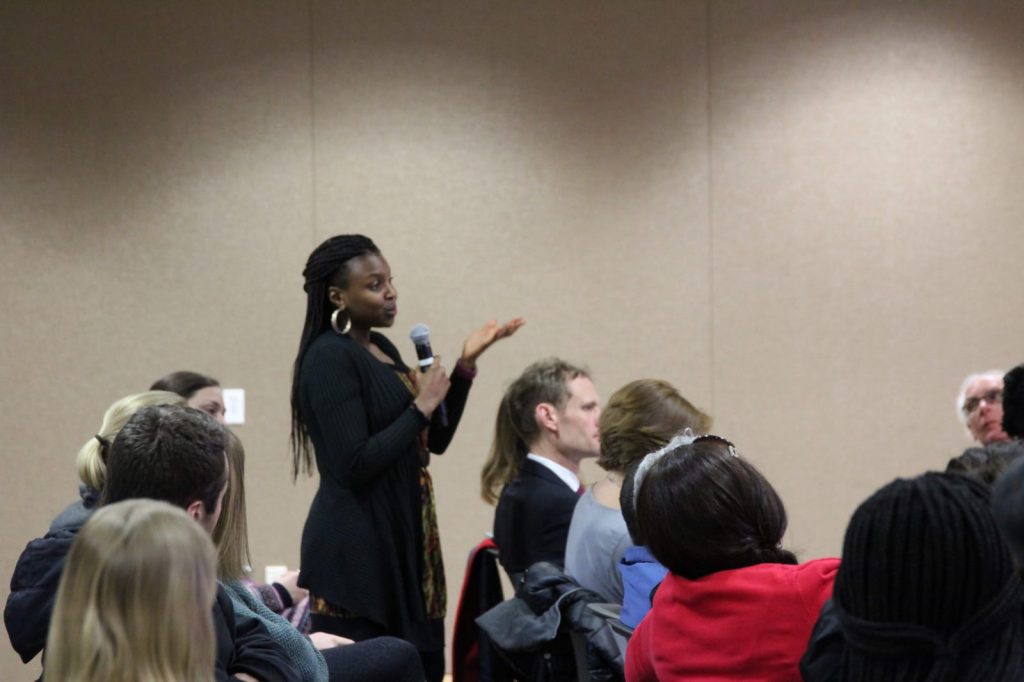The Cost of Breathing: The Sangaredi Mine and the Pfizer Vaccine
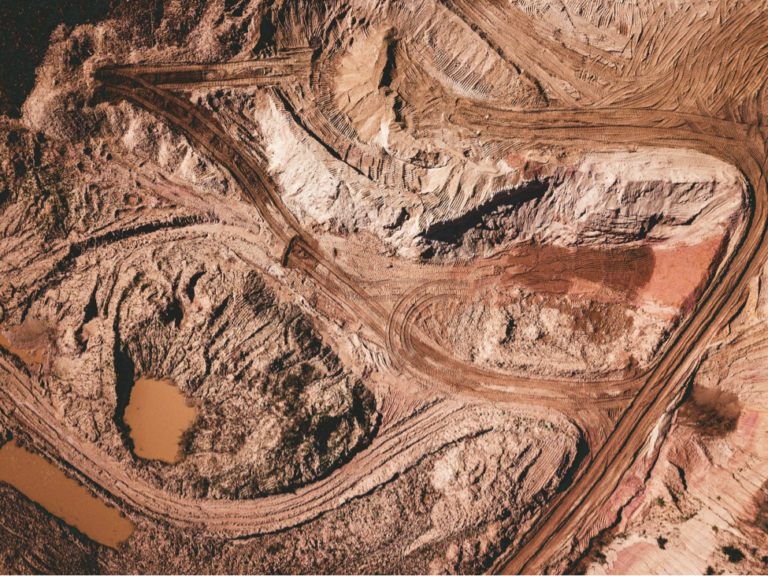
Madeline Quasebarth, Research Fellow, African Political Economy Policy Lab
mquasebarth@africacfsp.org
The global trade network of raw materials has been subject to much research and discussion. This paper links the history of the Guinean Bauxite mine, known as the Sangaredi Mine, to the distribution of the Pfizer COVID-19 vaccine. This linkage serves as a case study which speaks to the more extensive dialogue of exploitative resource mining and global health inequity. The COVID-19 virus and vaccine amplify the neo-colonial legacy affecting Guinea’s economic health and the well-being of its population. The linkage highlighted in this paper serves as an essential avenue to discuss long-standing policies rooted in economic inequity.
Disclaimer
The following corporations are mentioned in this paper: Pfizer, Alcoa, Rio Tinto, Halco, Corning, Compagnie des Bauxites de Guinée, along with various subsidiaries of the aforementioned parent corporations. These corporations are discussed to highlight certain inequities brought about by neoliberalism and neocolonialism. While this paper serves the purpose of discussing inequities, it merely demonstrates a loose correlation that brings to light a larger transnational issue. All facts in this paper are cited and documented through research and public access information. At no point does this paper, the Africa Center for Strategic Progress, nor the author claim that these corporations are responsible for COVID-19 vaccine inequity; this paper serves to trace the flow of raw materials out of Guinea.
Introduction
The world has watched in horror as COVID-19 has seeped into every country, taking lives and disrupting routines at an incredible pace. In every community that it has touched, COVID-19 has laid bare the myriad of structural inequities worldwide.1J. Jaiswal, et al. “Disinformation, Misinformation and Inequality-Driven Mistrust in the Time of COVID-19: Lessons Unlearned from AIDS Denialism.” AIDS and Behavior, vol. 24, no. 10, Oct. 2020, pp. 2776–80. DOI.org (Crossref), doi:10.1007/s10461-020-02925-y; Laster Pirtle, Whitney N. “Racial Capitalism: A Fundamental Cause of Novel Coronavirus (COVID-19) Pandemic Inequities in the United States.” Health Education & Behavior, vol. 47, no. 4, Aug. 2020, pp. 504–08. DOI.org (Crossref), doi:10.1177/1090198120922942.With the vaccine within grasp, economically developed nations can begin to take a sigh of relief. The European Union, Japan, and the United States have already ordered over 520 million Pfizer vaccines.2Sam Meredith. “Covid Vaccine Front-Runners: How Much They Cost, Who’s Bought Them and How They’re Stored.” CNBC, 17 Nov. 2020, https://www.cnbc.com/2020/11/17/covid-vaccines-how-much-they-cost-whos-bought-them-and-how-theyre-stored.html. However, there is growing global concern that nations experiencing economic poverty will be vaccine-less for years after their wealthier counterparts have bought themselves into post-pandemic normality.3COVID-19: Oxford/AstraZeneca Vaccine a Boost for Global Access, but Huge Inequality Remains. https://www.amnesty.org/en/latest/news/2020/11/oxford-astrazeneca-vaccine-a-boost-for-global-access-but-huge-inequality-remains/. Accessed 14 Dec. 2020.
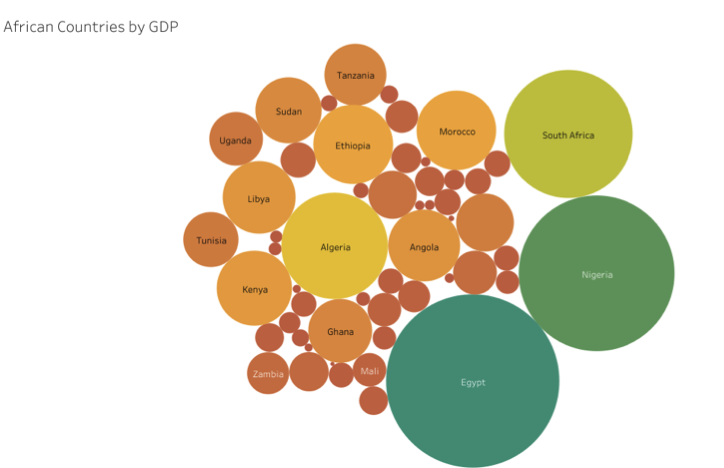
This fear is not unfounded. There is a well-documented trend of global inoculation inequality.4State of inequality: childhood immunization. Geneva: World Health Organization; 2016. Licence: CC BY-NC-SA 3.0 IGO To address this known inequality, the U.N. created the COVAX initiative to bring together economically-developed and developing countries to disseminate the vaccine to the most vulnerable individuals, regardless of nationality. The COVAX initiative highlights the international push to create a sense of global community in the face of COVID-19. As viruses do not care for borders, transnationalism and international cooperation are paramount in ending the COVID-19 pandemic. However, while transnational partnership is the center of global rhetoric, the neo-colonial legacies of the late 1980s – rooted upon the original colonial project – continues to drain Africa of its resources without providing an appropriate reciprocal relationship. Guinea provides a case study on how neoliberalism’s tools have manifested in the continued draining of African raw materials to serve developed nations’ health and well-being with a specific relationship to the Pfizer COVID-19 vaccine distribution.
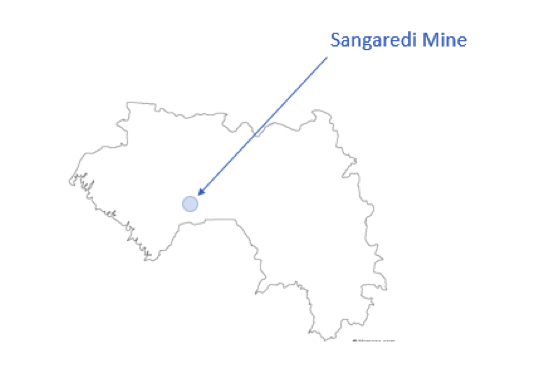
Bauxite and the Pfizer Vaccine
The draining of African resources by principally European and American powers is not a new occurrence. From the trans-Atlantic slave trade to Belgium’s genocide in the Congo Free State, Africa has long suffered from colonialism and its legacies5Patrick Bond. “The Dispossession of African Wealth at the Cost of Africa’s Health.” International Journal of Health Services, vol. 37, no. 1, Jan. 2007, pp. 171–92. DOI.org (Crossref), doi:10.2190/UK65-4235-N866-3R34; Bond, Patrick. Looting Africa: The Economics of Exploitation. University of KwaZulu-Natal Press ; Zed Books ; Distributed in the USA by Palgrave Macmillan, 2006.. Guinea is one of the world’s poorest countries, with a GDP of USD $10.91 billion (2018). To put this in context, their GDP is nearly USD $20 billion dollars lower than the lowest ranking GDP state in the United States.6Jeff, Desjardins. “Animation: The 20 Largest State Economies by GDP in the Last 50 Years.” Visual Capitalist, August 22 2019, https://www.visualcapitalist.com/animation-the-20-largest-state-economies-by-gdp-in-the-last-50-years/.
However, Guinea has what is thought to be the most crucial source of high-grade bauxite globally.7Bonnie K, Campbell., International Development Research Centre (Canada), and Nordiska Afrikainstitutet. Mining in Africa: Regulation and Development. London ; New York, NY : Ottawa, ON, Canada : Uppsala, Sweden: Pluto Press ; International Development Research Centre ; Nordiska Africainstitutet, 2009. Pg. 66 Bauxite is a reddish rock with a high aluminum content that creates alumna and aluminum when processed correctly.8Michelle K. Evans., et al. “Diagnosing and Treating Systemic Racism.” New England Journal of Medicine, vol. 383, no. 3, July 2020, pp. 274–76. DOI.org (Crossref), doi:10.1056/NEJMe2021693. Guinea is capable of generating 40% of the global bauxite production, and it accounts for 40% of the U.S. consumption of this raw material9Bonnie, K Campbell., International Development Research Centre (Canada), and Nordiska Afrikainstitutet. Mining in Africa: Regulation and Development. London ; New York, NY : Ottawa, ON, Canada : Uppsala, Sweden: Pluto Press ; International Development Research Centre ; Nordiska Africainstitutet, 2009. Pg. 66. It may seem strange that this reddish rock has any connection to a virus that emerged in 2019; nonetheless, there are massive economic and health inequities resulting from this correlation.
The Pfizer COVID-19 vaccine presents a unique challenge in terms of storage and transportation. An ultra-low temperature freezer is needed for long term storage of the vaccine.10COVID-19 Vaccine U.S. Distribution Fact Sheet | Pfizer. https://www.pfizer.com/news/hot-topics/covid_19_vaccine_u_s_distribution_fact_sheet. Accessed December 11 2020.] This necessity makes it difficult for rural, hard-to-access locations and lower-income communities to access and administer this vaccine.11Foundation, Thomson Reuters. “COVID-19: Which Vaccine Could Reach Developing Countries First?” News.Trust.Org, https://news.trust.org/item/20201126105058-qbp9c/. Accessed 14 Dec. 2020 Furthermore, it adds another hurdle to an already delicate vial production. To overcome this, Pfizer signed a multi-year contract with the glass-making company Corning on May 28, 2020. Corning revolutionized glass vial production by substituting the usual boron component for aluminum in its glass-making process.12Jared S Hopkins. “Covid-19 Vaccines Could Depend on the Strength of This Vial.” Wall Street Journal, November 13 2020. www.wsj.com, https://www.wsj.com/articles/covid-19-vaccines-could-depend-on-the-strength-of-this-vial-11605306378. The aluminum makes the vials stronger and less likely to micro-fracture when transported and exposed to extreme temperatures, making it a suitable vial for the Pfizer vaccine. This simple switch of materials from boron to aluminum links Guinea to the Pfizer vaccine. It highlights the global inequality that deeply affects Guinean citizens’ health and well-being as a result of neoliberalist economic policy.
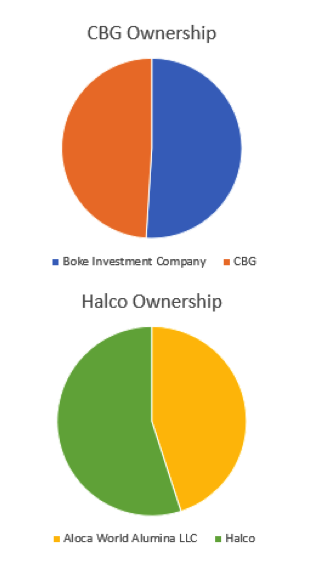
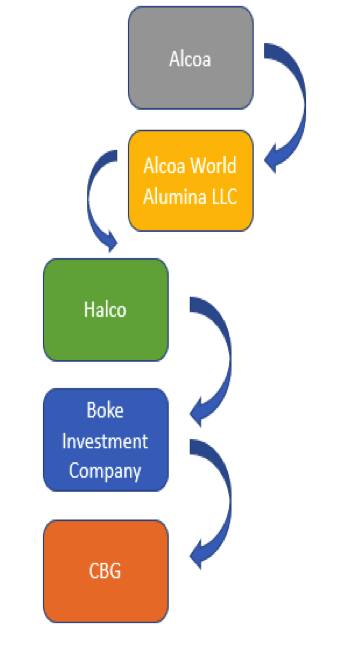
Corning, Alcoa, & a Neoliberal Legacy
Corning has a long-standing supply relationship of over 15 years with the mining company Alcoa.13StackPath.https://www.lightwaveonline.com/home/article/16653984/corning-and-alcoa-sign-optical-fibre-supply-agreement. Accessed 11 Dec. 2020. While the amount of bauxite that Corning has purchased from Alcoa this past year is not public knowledge, there is a demonstrated material exchange partnership between these two corporations. There was a USD $133 million cash flow from Corning to Alcoa during the second quarter of 2020.14Alcoa Corp Customers and Comparisons of Financial Results – CSIMarket. https://csimarket.com/stocks/competition2.php?markets&code=AA. Accessed 11 Dec. 2020. Alcoa, Rio Tinto Alcan, and Halco are the majority owners of the largest bauxite mine in Guinea.15Bonnie K., Campbell., International Development Research Centre (Canada), and Nordiska Afrikainstitutet. Mining in Africa: Regulation and Development. London ; New York, NY : Ottawa, ON, Canada : Uppsala, Sweden: Pluto Press ; International Development Research Centre ; Nordiska Africainstitutet, 2009. Pg. 94 The Sangaredi mine encapsulates the effects of neoliberal economic policy as a tool to continue the neocolonial project at the cost of individuals’ health and well-being.
Neoliberalism is a complicated term, popularized by the Academy, which now encompasses a myriad of definitions and conceptual framings. This ambiguity serves as a tool to, at times, protect neoliberalism from full public scrutiny.16Venugopal, Rajesh. “Neoliberalism as concept.” Economy and Society 44.2 (2015): 165-187. This paper defines neoliberalism as a philosophy, rooted in classical Western liberalism, which considers individual freedom to be paramount. When translated into economic policy, neoliberalism refers to a belief that government intervention in the economy should only serve to facilitate, and never impede, private capital. In practice, this often means that large, private corporations end up having undue influence over economic policy, with government serving at their behest. This is what philosopher Noam Chomsky refers to as “socialism for capitalists, and harsh, free market capitalism for everyone else.”17Noam, Chomsky, and Robert Pollin. The Climate Crisis and the Global Green New Deal: The Political Economy of Saving the Planet. First edition paperback, Verso Books, 2020 When applied internationally, neoliberal economic policy amounts to privileging the interests of powerful multinational entities over (and sometimes at the expense of) national sovereignty. The potential of neoliberalism leading to a usurpation of national political power by private interests acts as the economic arm of neo-colonialism.18Kawme, Nkrumah. Neo-Colonialism: The Last Stage of Imperialism. 1965. Panaf, 2004. Thus by deploying a free market capitalistic strategy of morphing the very fabric of independent nation states into a marketable commodity accomplishes the strategy of inequitable development19J, Gledhill. (2007). Neoliberalism. In A Companion to the Anthropology of Politics (eds D. Nugent and J. Vincent). https://doi.org/10.1002/9780470693681.ch21.
In the 1980s, faced with rising debts, Guinea agreed to a structural adjustment loan presented by the International Monetary Fund (IMF) and the World Bank.20Bonnie K Campbell International Development Research Centre (Canada), and Nordiska Afrikainstitutet. Mining in Africa: Regulation and Development. London ; New York, NY : Ottawa, ON, Canada : Uppsala, Sweden: Pluto Press ; International Development Research Centre ; Nordiska Africainstitutet, 2009. Pg. 80 At this time, Guinea was attempting to establish bauxite refinement to aluminum within the country as a means to increase export revenue. To do this, Guinea was leveling a high USD $13 tax on bauxite exports. As part of Guinea’s new relationship with global trade, Guinea decreased the tax on bauxite and lost substantial revenue, which favored the mining companies Alcoa, Rio Tinto Alcan, and Halco.21Bonnie K Campbell International Development Research Centre (Canada), and Nordiska Afrikainstitutet. Mining in Africa: Regulation and Development. London ; New York, NY : Ottawa, ON, Canada : Uppsala, Sweden: Pluto Press ; International Development Research Centre ; Nordiska Africainstitutet, 2009. Pg. 81 These companies then purchased 51% of the government-owned mining company in charge of the Sangaredi mine, which produces around 14 million tons annually.22Bonnie K Campbell., International Development Research Centre (Canada), and Nordiska Afrikainstitutet. Mining in Africa: Regulation and Development. London ; New York, NY : Ottawa, ON, Canada : Uppsala, Sweden: Pluto Press ; International Development Research Centre ; Nordiska Africainstitutet, 2009. Pg. 94 As majority owners but non-manager operators of the Sangaredi mine, these companies profit from the bauxite mining without being directly responsible for miners treatment, environmental impacts, and local services. In Alcoa’s 2019 Annual Report, it only lists energy-related purchase obligations as operational responsibility of the Sangaredi mining operation.iv
This arrangement leaves the burden of miners’ health, the environmental impact, and the expansion of local services on the shoulders of the Guinean government and the government-owned mining company, Compagnie des Bauxites de Guinée (CBG). CBG is majority-owned by Halco, 49% to 51%, through its subsidiary Boke Investment Company. Alcoa World Alumina LLC – a majority-owned subsidiary of Alcoa – owns 45% of Halco.
Health Consequences, Responsibility, and the Sangaredi Mine
Ultimately this arrangement results in CBG being an American incorporated company, which securely recentralizes the power of CBG away from Guinea to the United States while sheltering the parent companies from backlash. In this way, these multinational companies extract bauxite from the land and extract most of the mines’ financial benefit while leaving behind sickness and unfair land acquisition. In Kwame Nkrumah’s words, “neo-colonialism is also the worst form of imperialism. For those who practice it, it means power without responsibility and for those who suffer from it, it means exploitation without redress.” 23Kawme, Nkrumah. Neo-Colonialism: The Last Stage of Imperialism. 1965. Panaf, 2004. Human Rights Watch (HRW) published a report in 2017 outlining explicitly the exploitations without redress suffered by those living and working in and around the mine. The report enumerated the physical, mental, and economic hardships those living near Sangaredi face due to mining operations. In 2015 Guinean President Alpha Condé received a USD $135 million loan from the International Finance Corporation (IFC), even though the proposed expansion violated numerous IFC standards on health, safety, and environmental well-being.24“CBG Expansion.” Early Warning System, https://ews.rightsindevelopment.org/projects/34203-cbg-expansion/. Accessed 13 Dec. 2020.
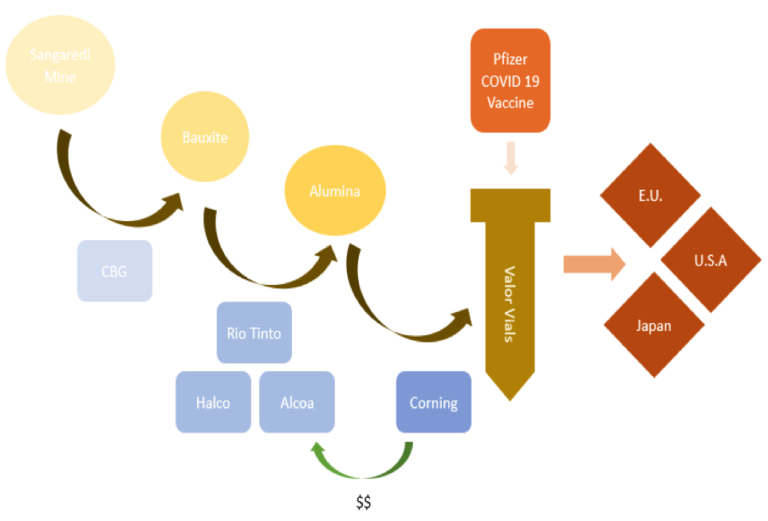
HRW found that this IFC funded expansion has resulted in the unfair acquisition of ancestral lands and a profound lack of essential services like clean water and electricity access. Thirteen affected villages filed a claim against the IFC and are now awaiting mediation.25Guinea: Demanding a Fair Deal for Communities from Alcoa-Rio Tinto Bauxite Mine – Inclusive Development International. http://www.inclusivedevelopment.net/cases/guinea-alcoa-rio-tinto-bauxite-mine/. Accessed 13 Dec. 2020. These villages argue that the IFC knowingly supplied a loan to the Guinean government that would result in detrimental environmental, health, and cultural impacts. These impacts include increased gender inequity and severe health concerns. HRW most notably highlighted the acute respiratory illness from which many bauxite miners suffer. While the Guinean government does not and has not tracked the air quality around Sangaredi mines, there has been a documented increase in respiratory illness in and around the mines.26“‘What Do We Get Out of It?'” Human Rights Watch, October 4 2018, https://www.hrw.org/report/2018/10/04/what-do-we-get-out-it/human-rights-impact-bauxite-mining-guinea. HRW draws upon previous studies about health conditions around bauxite mining to conclude that the Sangaredi mine is responsible for these health impacts. Specifically, HRW notes that the Sangaredi mine exceeds the maximum safe size limit for particles caused by mining operations. The Guinean government claims that they cannot afford to track air quality around the mine effectively, while the mining companies deny prerogative to supply this initiative27“‘What Do We Get Out of It?'” Human Rights Watch, October 4 2018, https://www.hrw.org/report/2018/10/04/what-do-we-get-out-it/human-rights-impact-bauxite-mining-guinea.. Thus, resulting in a clear imbalance of power, one of which non-Guinean corporations stand to make a profit in the millions while Guinean citizens suffer economically and physically. It is unclear if the Guinean government is unable or unwilling to assist miners. However, the international business community stands to benefit at even more extraordinary lengths than before considering the necessity of alumina for the Pfizer vaccine distribution.
Conclusion: The Inequitable Value of Human Lives
While Corning is not the sole customer of Alcoa World Alumina LLC, nor does the Sangaredi mine only supply to Boke Investment Company, the bauxite mine, at the cost of miners’ and residents’ respiratory well-being, plays an essential role in ensuring that a vaccine – which is unlikely ever to reach these miners – is delivered quickly and safely to a privileged few. It is a tragic irony that, in fulfilling their role in addressing a pandemic which causes severe respiratory problems, many in Guinea are themselves succumbing to respiratory illness.
A system which overvalues the lives of globally economically privileged individuals was set in place long before the onset of COVID-19, but its ramifications are still being felt today. With the rise in infections and hope of a vaccine on the horizon, it is essential to reconceptualize how lives are valued and to be cognizant of the raw materials that allow – and disallow – saving lives.
Based on your interests, you may also wish to read:
- How Can Sub-Saharan African Countries Minimize the Impact of Coronavirus Pandemic on Economic Performance?
- Africa, COVID-19, and the International Financial Institutions
- Restarting Growth in Countries with Ongoing Conflicts After Covid-19
- To Benefit from the Belt & Road Initiative, Africa Needs a Unified Approach


